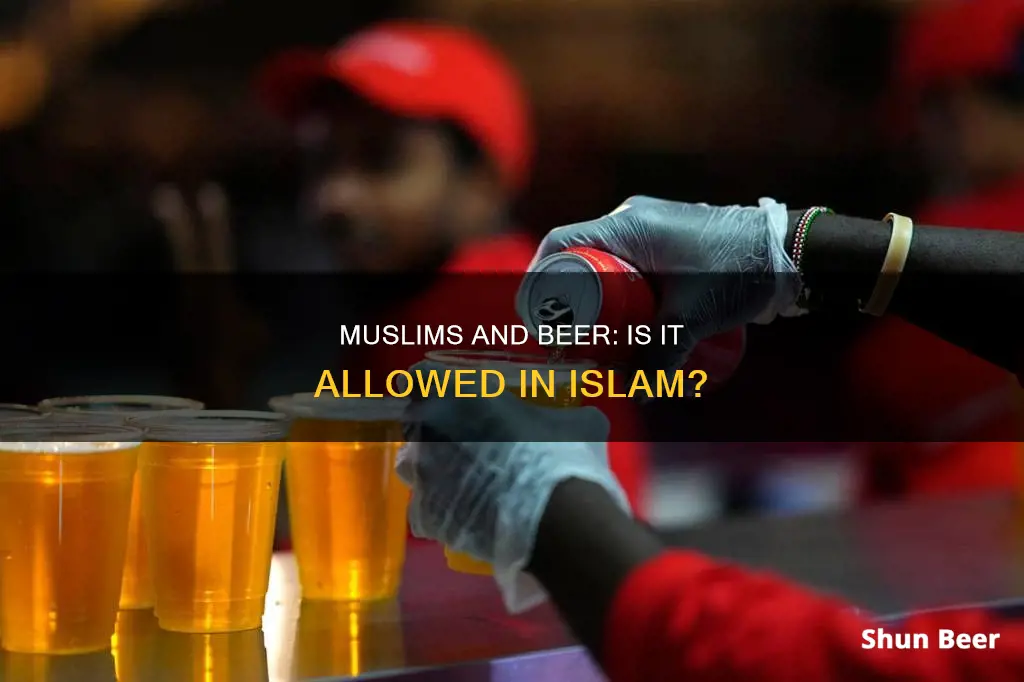
Alcohol is considered haram, or forbidden, in Islam, with the Quran calling intoxicants the work of Satan. However, a minority of Muslims do drink and believe consuming alcohol is not forbidden by the Quran.
The Quran does not prescribe a penalty for consuming alcohol, but according to a hadith, Prophet Muhammad prescribed 40 lashes for those accused of drinking wine.
Islamic scholars and Muslim religious authorities have ruled that non-intoxicating beer is permissible because it is completely free of alcohol, or because it contains a minuscule amount of alcohol that does not cause intoxication.
What You'll Learn

Muslims who drink alcohol
Alcohol consumption is considered haram, or forbidden, in Islam. Islamic scholars and Muslim religious authorities point to a verse in the Quran, the Muslim holy book, that calls intoxicants "the work of Satan" and instructs believers to avoid them. Additionally, they cite sayings of Prophet Muhammad and the negative effects that alcohol can have. While the prohibition on alcohol in Islam is believed to be widely heeded, not all Muslims abstain from drinking.
A minority of Muslims do drink and believe that consuming alcohol is not forbidden by the Quran. Historically, many Muslim elites consumed alcohol, including during the reign of the Umayyads, the Abbasids, Islamic Spain (al-Andalus), and dynasties that ruled Egypt and the eastern, Persianate half of the Muslim world.
Islamic scholars and religious experts provide advice and issue fatwas (religious opinions) to guide Muslims who drink alcohol or face alcohol-related situations. For instance, a fatwa may advise a Muslim to avoid serving alcohol to family members, while still maintaining respectful family relationships.
The Hanafi school of Islamic law interprets the term "khamr" (forbidden beverage) in the Quran more narrowly than other schools, allowing alcoholic beverages made with fruits, grains, or honey other than grapes and dates. However, from the 12th century onwards, the Hanafi school embraced the general prohibition of all alcoholic beverages, in line with other schools.
In conclusion, while alcohol consumption is forbidden in Islam, a minority of Muslims do drink, and Islamic scholars provide guidance on navigating alcohol-related situations for those who may face ethical dilemmas.
Why Drinking Beer Makes It Hard to Burp
You may want to see also

Alcohol in Muslim-majority countries
Alcohol consumption is considered haram, or forbidden, in Islam. The Quran, the Muslim holy book, calls intoxicants "the work of Satan" and tells believers to avoid them. Additionally, Islamic scholars and Muslim religious authorities cite sayings of Prophet Muhammad and the negative effects that alcohol can have.
While the prohibition on alcohol in Islam is believed to be widely heeded, not all Muslims abstain from drinking. Some drink, whether privately or publicly. In a Pew Research Center survey, most people surveyed said that drinking alcohol was morally wrong. More than half in all countries where Muslims were surveyed held this view, including more than nine-in-ten in Thailand, Ghana, Malaysia, the Palestinian territories, Indonesia, Niger, and Pakistan. Still, in 11 of the 37 countries where this question was asked, at least one-in-ten said that drinking alcohol is morally acceptable, and in some countries, sizable percentages said consuming alcohol is not a moral issue.
Alcohol is available in some Islamic nations, though regulations vary widely, and there can be intricate rules and restrictions on its sale or consumption. Some countries, like Saudi Arabia, outlaw alcohol altogether. Drinking there can be punished by flogging, fines, imprisonment, and, for foreigners, deportation. In other places, like Dubai, there is a more relaxed approach. Dubai boasts a variety of bars, nightclubs, and lounges that attract many visitors and well-to-do expatriate residents. In recent years, the city has also been increasingly loosening laws governing alcohol sales and possession of liquor. As in some other places, alcohol sales provide a lucrative tax revenue source.
Alcohol is sold freely in liquor stores in Jordan and served in bars and restaurants throughout the capital of Amman. It is also available in Muslim-majority Egypt, which is traditionally popular with tourists and is home to a Christian minority. There, the young and rich can sip on cocktails or wines in beach clubs or bars, while music plays. Wine, beer, and spirits can also be ordered online, among other options. Still, drinking is rejected by most; in the Pew study, 79% of surveyed Muslims in Egypt said they viewed alcohol as morally wrong.
In countries where alcohol is banned, some have gone to great lengths to obtain it, at times risking arrest or worse. In Saudi Arabia, for example, there have been reports of liquor runs to neighboring Bahrain and attempts to sneak booze into the kingdom by hiding bottles of whisky in socks and disguising cans of beer as Pepsi. Some endeavors, however, end in tragedy. In 2002, 19 people in Saudi Arabia died and others were hospitalized after drinking cologne containing methanol. In Iran, some have also died from methanol poisoning after drinking toxic homemade brews.
The availability and consumption of alcohol in Muslim-majority countries vary, with some implementing a total ban, others taking a regulatory approach, and still, others combining a ban for the Muslim population with concessions that permit non-Muslim populations to consume alcohol.
Drinking Beer on Gulf Shores Beach: What's Allowed?
You may want to see also

The punishment for drinking alcohol
Drinking alcohol is forbidden in Islam and is considered haram, or forbidden. Islamic scholars and Muslim religious authorities typically point to a verse in the Quran, the Muslim holy book, that calls intoxicants "the work of Satan" and instructs believers to avoid them.
In addition to the punishment in this world, drinking alcohol is considered a major sin that can lead to hell in the afterlife. However, if a Muslim repents and stops drinking, Allah will accept their repentance.
Muslims who drink alcohol are advised to seek guidance from Islamic scholars on how to reconcile their actions with their faith, and to strive to give up drinking and perform their religious duties.
Beer and Crohn's Disease: What's Safe to Drink?
You may want to see also

Alcohol in food and medicine
Firstly, it is essential to understand the general Islamic stance on alcohol. Drinking alcohol is considered "haram" or forbidden in Islam, as stated in the Quran, the Muslim holy book. Islamic scholars and Muslim religious authorities cite a specific verse that refers to intoxicants as "the work of Satan" and instructs believers to avoid them. Additionally, they refer to the sayings of Prophet Muhammad and the negative consequences of alcohol consumption.
When it comes to alcohol in food and medicine, the key considerations are the possibility of intoxication and the presence of alcohol traces. If a food or medicine contains alcohol in a minuscule amount that does not cause intoxication and has no effect, it is generally considered permissible to consume. However, if the alcohol content is high enough to cause intoxication or if its traces remain in the mixture, it is deemed "haram" and prohibited.
Islamic scholars provide detailed guidance on this matter. For instance, they advise against consuming dishes cooked with alcohol, as the alcohol may not be fully evaporated during the cooking process. They also emphasize that the prohibition extends to all manners of using alcohol, whether in food or drink.
In the case of medicines, Islamic scholars recommend seeking wholesome treatments and avoiding haram substances whenever possible. However, if a medicine contains alcohol and is necessary for an individual's life, Islamic scholars may permit its use, especially if there are no alternative treatments available.
It is worth noting that some Muslim scholars differentiate between the consumption of alcohol in its pure form and its presence in food or medicine. They argue that while consuming undiluted alcohol, even in small amounts, is not permissible, its presence in other substances may be acceptable under certain conditions.
In conclusion, the issue of alcohol in food and medicine is nuanced in Islam. While the general prohibition of alcohol is clear, there are exceptions made for certain foods and medicines where the alcohol content is minimal or has no intoxicating effect. Islamic scholars provide detailed guidance on this matter, taking into account the specific circumstances and potential alternatives.
Drinking Beer at the Airport: Lobby Laws and Limits
You may want to see also

Alcohol and prayer
Alcohol is considered haram, or forbidden, in Islam. Islamic scholars and Muslim religious authorities point to a verse in the Quran, the Muslim holy book, that calls intoxicants "the work of Satan". Drinking alcohol is deemed a major sin, and Muslims are encouraged to engage in sincere repentance if they do drink.
There are many authentic hadiths (sayings of Prophet Muhammad) concerning the punishment for one who drinks alcohol. These hadiths state that the prayers of someone who has consumed alcohol will not be accepted for forty days. This does not mean that the prayers are invalid or that the person should give up praying, but rather that they will not be rewarded for them.
The hadiths also state that if the person repents, Allah will forgive them. If they drink alcohol again, their prayers will not be accepted for another forty days, and so on.
The punishment for drinking alcohol applies to those who do not repent. However, if someone repents and turns to Allah, their good deeds will be accepted, as stated in the hadith: "The one who repents from sin is like one who did not commit sin."
The consumption of alcohol is believed to hinder remembrance of God and prayer.
Drinking Beer on TC: What You Need to Know
You may want to see also
Frequently asked questions
Drinking alcohol is considered haram (forbidden) in Islam. Islamic scholars and Muslim religious authorities point to a verse in the Quran that calls intoxicants "the work of Satan" and instruct believers to avoid them. The Quran also states that "whatever intoxicates in large quantities, a little of it is haram".
While the majority of Muslims abstain from drinking alcohol, a minority do drink, either privately or publicly. In a Pew Research Center survey, most respondents said that drinking alcohol was morally wrong, but in 11 out of 37 countries, at least 10% said that consuming alcohol is morally acceptable.
The Quran does not prescribe a penalty for consuming alcohol, but some hadith (the sayings of the Prophet Muhammad) suggest that the punishment for drinking alcohol is 40 lashes. Additionally, according to Islamic scholars, if a Muslim consumes alcohol, their prayer will not be accepted for 40 days unless they sincerely repent.







